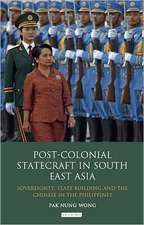Making Waves: Politics, Propaganda, and the Emergence of the Imperial Japanese Navy, 1868-1922
Autor J. Schenckingen Limba Engleză Hardback – 17 ian 2005
This book explores the political emergence of the Imperial Japanese Navy between 1868 and 1922. It fundamentally challenges the popular notion that the navy was a 'silent,' apolitical service. Politics, particularly budgetary politics, became the primary domestic focus—if not the overriding preoccupation—of Japan's admirals in the prewar period. This study convincingly demonstrates that as the Japanese polity broadened after 1890, navy leaders expanded their political activities to secure appropriations commensurate with the creation of a world-class blue-water fleet.
The navy's sophisticated political efforts included lobbying oligarchs, coercing cabinet ministers, forging alliances with political parties, occupying overseas territories, conducting well-orchestrated naval pageants, and launching spirited propaganda campaigns. These efforts succeeded: by 1921 naval expenditures equaled nearly 32 percent of the country's total budget, making Japan the world's third-largest maritime power. The navy, as this book details, made waves at sea and on shore, and in doing so significantly altered the state, society, politics, and empire in prewar Japan.
The navy's sophisticated political efforts included lobbying oligarchs, coercing cabinet ministers, forging alliances with political parties, occupying overseas territories, conducting well-orchestrated naval pageants, and launching spirited propaganda campaigns. These efforts succeeded: by 1921 naval expenditures equaled nearly 32 percent of the country's total budget, making Japan the world's third-largest maritime power. The navy, as this book details, made waves at sea and on shore, and in doing so significantly altered the state, society, politics, and empire in prewar Japan.
Preț: 448.49 lei
Preț vechi: 553.69 lei
-19% Nou
Puncte Express: 673
Preț estimativ în valută:
85.82€ • 93.51$ • 72.31£
85.82€ • 93.51$ • 72.31£
Carte tipărită la comandă
Livrare economică 23 aprilie-07 mai
Preluare comenzi: 021 569.72.76
Specificații
ISBN-13: 9780804749770
ISBN-10: 0804749779
Pagini: 304
Dimensiuni: 152 x 229 x 23 mm
Greutate: 0.54 kg
Ediția:1
Editura: Stanford University Press
Colecția Stanford University Press
ISBN-10: 0804749779
Pagini: 304
Dimensiuni: 152 x 229 x 23 mm
Greutate: 0.54 kg
Ediția:1
Editura: Stanford University Press
Colecția Stanford University Press
Recenzii
"Schencking's fine study provides an essential foundation for studying this issue in future works."—Monumenta Nipponica
"Making Waves...is meticulously researched, well written, and compelling throughout."—Asian Studies Review
"Japan specialists and naval historians will relish this hearty new addition to the modern Japanese history canon. In a market driven by polish over substance, Making Waves is distinctly nourishing fare....It will remain an essential reference for Japan scholars and naval historians for years to come."—Pacific Affairs
"Anyone interested in the dynamics of arms races or the Pacific origins of World War II or even the early twentieth century world more generally can read [this book] with great profit. 'Banzai!' for a superb work by a rising star in the historical firmament."—Journal of Military History
"Making Waves is an important book for historians of Japan, for naval and military historians, and for those interested in the relationship between politicians and the military in the pursuit of modern state power."— Technology and Culture
Notă biografică
J. Charles Schencking teaches Japanese history at the University of Melbourne.
Textul de pe ultima copertă
"Schencking's fine study provides an essential foundation for studying this issue in future works."—Monumenta Nipponica
“Making Waves...is meticulously researched, well written, and compelling throughout.”—Asian Studies Review
“Making Waves...is meticulously researched, well written, and compelling throughout.”—Asian Studies Review
Descriere
This book examines how Japan's naval leaders worked at both the elite political and local levels in society to secure the vast financial support necessary to assemble the world's third-largest naval force between 1868 and 1922.












